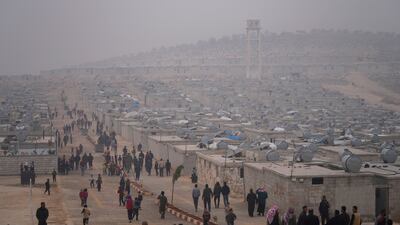Two rival resolutions on extending the opening of border crossings in northern Syria to help millions of displaced, aid-dependent civilians will be voted on at the UN on Monday.
Brazil and Switzerland want the Bab Al Hawa border crossing – the main conduit for aid into the rebel-held north of the country – to be open for another 12 months. Russia, one of Syrian President Bashar Al Assad’s main backers, wants the extension limited to only six months.
Damascus supported expanding aid crossings on the border after the 7.8-magnitude earthquake in February damaged many rebel-held areas and, to a lesser extent, government-controlled territory.
But Mr Al Assad and Russia say aid could support, directly or indirectly, militant groups in the north, especially in Idlib which is home to about 2 million Syrians displaced from across the country by a 12-year-long war that still simmers.
The UN has accused rebel groups and the government for restricting aid deliveries to gain political leverage.
Idlib is controlled by Hayat Tahrir, a group once linked to Al Qaeda. Other border areas, including Bab Al Hawa, are controlled by Turkish-backed militias, many of them comprising former rebels who fought the regime.
The rival resolutions obtained on Friday by the Associated Press virtually ensure aid deliveries will continue through the main Bab Al Hawa crossing for at least six months.

Hundreds of thousands of people in Idlib live in tented settlements and rely on aid that comes through Bab Al Hawa.
The earthquake caused more than 4,500 deaths in north-west Syria and about 855,000 had their homes damaged or destroyed, according to the UN.
UN humanitarian chief Martin Griffiths told the Security Council on June 29 the conflict in Syria had pushed 90 per cent of its people into poverty and millions face cuts in food aid this month because of a funding shortfall.
He said the $5.4 billion UN humanitarian appeal for Syria – the world’s largest – is only 12 per cent funded, meaning emergency food aid for millions of Syrians could be cut by 40 per cent this month.
On Friday, he said the UN World Food Programme needed $200 million to avoid the cuts.
The Security Council initially authorised aid deliveries in 2014 from Turkey, Iraq and Jordan through four crossing points into opposition-held areas in Syria. But over the years, Syria's close ally Russia, backed by China, has reduced the authorised crossings to only Bab Al Hawa from Turkey – and the mandate from a year to six months. The current six-month term expires on Monday.
Russia has pushed for more aid to be delivered across front lines within Syria, which would give the government in Damascus control over the shipments. It has also pushed for early recovery projects to provide jobs and help the country's economy.

